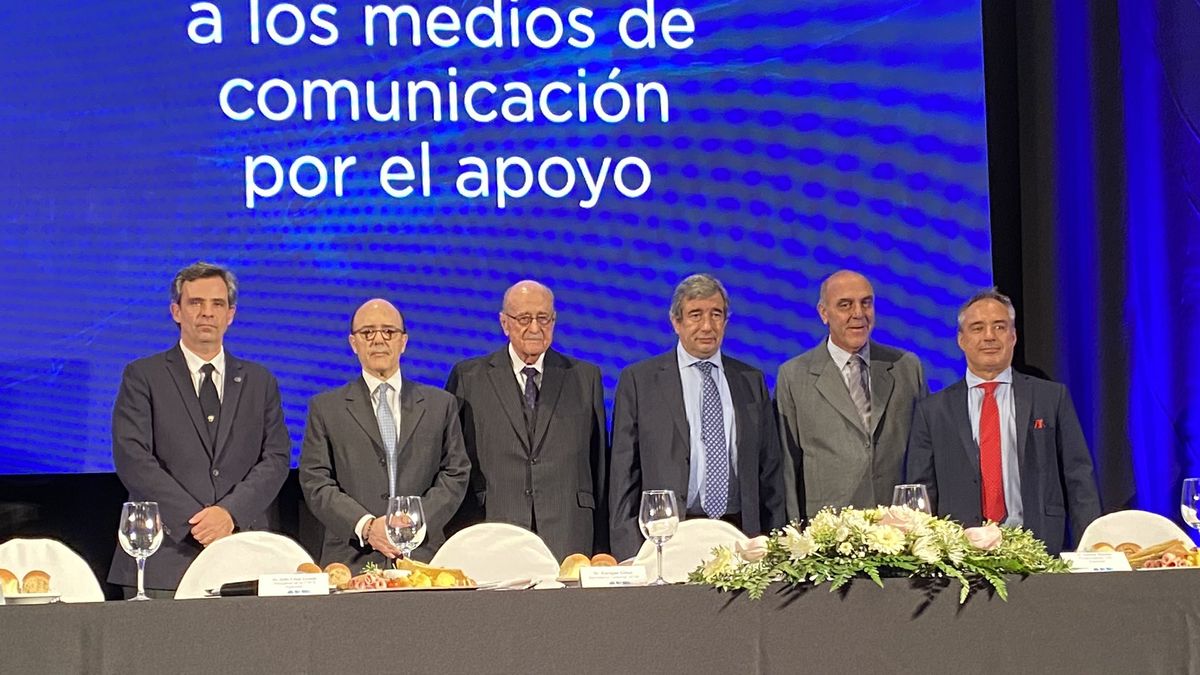The four most important business chambers in the country agreed to point out the problem of exchange delay and the concern generated by the possible repeal of the social security reform, when performing an analysis of the current state of Uruguay and present their initiatives for the electoral year before leaders and pre-candidates during the traditional lunch of the Association of Marketing Leaders.
Besides the competitiveness and the eventual effects of the plebiscite of the PIT-CNT, The representatives also spoke about the reduction of workday and the economic activity before a qualified audience where, in addition to businessmen, there was the new Minister of Labor and Social Security, Mario Arizti; the mayor of Canelones, Marcelo Metediera; and the presidential candidates Álvaro Delgado and Guido Manini Ríos.
In this scenario, the president of the Rural Association of Uruguay, Patricio Cortabarría, stated that “the agro contributes almost 21% of the GDP and the employment that it generates impacts 17% of the total wage bill.” The agricultural union member reflected that “Uruguay had planned to grow 3% in 2023, but ended up growing 0.4% as a result of the drought”. “This shows the impact generated by the agricultural sector in the country,” he said.
Cortabarría estimated the deficit of the sector in 1,800 million dollars, separating it into approximately one thousand in the agriculture, 258 in cattle meat, 145 in lost meadows, 136 in dairy, 43 in fruit trees and 12 in viticulture.
Less bureaucracy, efficiency and productivity
For his part, the president of the Chamber of Commerce and Services, Julio Cesar Lestido, He focused his presentation on the presentation of the “Pact for the Homeland” that the union recently prepared and is offering to political candidates for ratification.
The creation of a “second job opportunity” for people deprived of liberty, the effective fight against organized crime, the modernization of the state and reduce tax burdens These are some of the main items of the proposal that Lestido argued in his presentation.
“How long will the private sector will pay the price State? It is one of the questions that commonly arises, which poses significant challenges. We need a more efficient State, and that is why it is essential that we continue prioritizing the reduction of public spending instead of resorting to tax and fee methods,” Lestido forcefully expressed.
Regarding other controversial aspects that are currently in the political debate and on which the document also expresses itself, such as the proposal of the Reduction of the working day. The businessman reaffirmed that “it must be tied to productivity” and that each case must be considered individually, an aspect that garnered some applause from those present at the lunch.
The president of the Chamber of Commerce did not avoid referring to the plebiscite called by the union center PIT-CNT on social security reform. “Its approval would affect the country with an unsustainable deficit,” Lestido stated.
Also the international insertion of the country was present in the content of his message: “We recognize the government’s efforts in the search for new markets and we hope that this becomes a State policy. We need to explore more avenues that allow us to advance and prosper in an increasingly dynamic global environment, calling for greater facilitation of exports and imports, reducing costs and times, positively impacting not only companies, but also consumers.”
Business cameras adm.jpeg
The importance of a competitive industry
At the time, the current vice president of the Chamber of Industries, Gabriel Murara, He also presented a series of proposals and analyzes that his sector proposes to the political system with the title “Action plan for the industrial development of Uruguay” that talks about having a competitive industry. For this, he mentioned the need in the medium term to “reduce the public spending and the weight of the state, lowering the number of public employees”, but also refers to measures to improve the work environment.
The document proposes reducing the public spending of the Central Government by around 20% of GDP. “This requires actions to control the fiscal sustainability, produces additional pressures on the real exchange rate and allows reducing tax pressure,” said Murara.
Regarding collective bargaining, the Chamber of Industries’ presentation states that there is bipartite negotiation for “large” companies and in the case of small or medium-sized ones, adherence to what has been agreed or the establishment of a particular negotiation per company.
Murara reflected on the importance of the industrial sector in the country’s economy. “In line with the predisposition to the industry, each product in our sector produces a value that corresponds to 17 billion dollars, of which approximately 10 billion are exported to countries on all continents. Considering the direct and indirect environment, they generate about 266,000 Job positions, 17% of the total personnel recovered in the country,” he contextualized.
The role of construction and a different argument against the PIT-CNT plebiscite
Finally, the president of the Chamber of Construction, Alejandro Ruibal, He also referred to the contribution that his sector makes to the national economy, which he placed at 10% of GDP taking into account the value chain of his industry, separating it into 4.9% direct, 3.5% indirect (suppliers and inputs) and an induced 1.8%, linked to the consumption generated by its workers when a work is installed in a geographical location. With this we arrive at a summary that 16% of the population employed in Uruguay is associated with the value chain of the construction.
Ruibal made a section to present proposals such as the creation of a National Infrastructure Agency that would have state participation and control, that would join the already existing infrastructure policy council, with broad participation from the private sector and that has already had its first meetings.
But without a doubt the most notable moment of the participation of the president of the Chamber of Construction was when he made reference to the position of his union regarding the plebiscite on the retirement reform. The representative of the union presented a different argument from those usually used by his colleagues from other business chambers, focusing in this case on the elimination of the AFAPs.
Along these lines, Ruibal considered that, given that this type of companies finance public works and infrastructure, their elimination would have an impact of eliminating 30 thousand jobs. “10-15% of construction jobs would not be there because all those projects that you see, in housing, airports, energy, educational centers in the interior of the country, which were concluded with the reintegration of the AFAPs, would be eliminated,” Ruibal expressed in a firm tone and concluded: “With this there can be no doubt that many jobs and the institutional stability of the country are at stake.”
Source: Ambito




